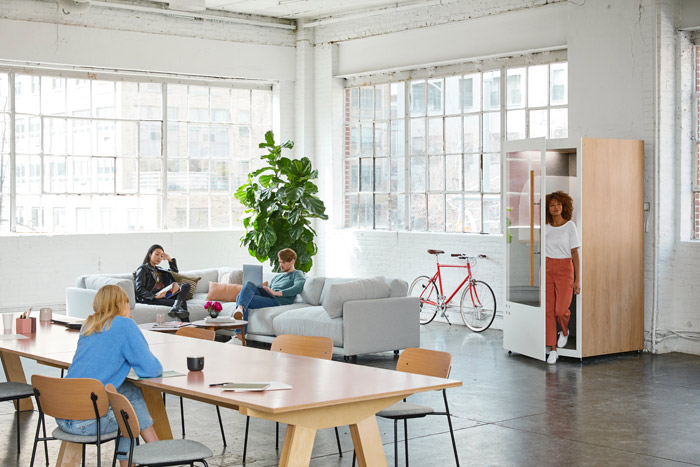現(xiàn)代辦公室發(fā)展的五個(gè)趨勢(shì) Five ways the increasingly mobile workforce is transforming office design
中國(guó)日?qǐng)?bào)網(wǎng) 2019-08-19 09:13

你還在隔間里辦公嗎?人家的辦公室早就大變樣了!隨著越來(lái)越多公司開(kāi)啟彈性工作時(shí)間和遠(yuǎn)程辦公模式,辦公室的功能和職員的需求也在悄然發(fā)生變化,辦公環(huán)境自然也要隨之改變。
1. Designated desks are no longer the norm
員工不再有固定的辦公桌

The days of cubicles and assigned desk stations are finally coming to an end. As more office employees start working from home full-time or only come into work on certain days of the week, it no longer makes sense for employers to keep individual, assigned desks around for everyone.
隔間和固定辦公桌的時(shí)代終于結(jié)束了。如今越來(lái)越多的員工全天在家工作,一周只有幾天去上班,給每個(gè)人保留固定的單人辦公桌不再有意義。
Instead, the office infrastructure is transforming to include more collaborative workspaces and unassigned seating in order to better serve employees who float in and out of the office. In this way, employees can find the spot that best suits them on a given day, while employers can save money on space and resources. It’s also becoming more common to see multiple clusters of desks or tables for different teams in order to promote unity and collaboration amongst them.
辦公室的基礎(chǔ)設(shè)施轉(zhuǎn)變?yōu)楦欣诤献鞯墓ぷ骺臻g,不再對(duì)座位進(jìn)行分配,以便更好地服務(wù)于進(jìn)出辦公室的員工。這樣,員工可以找到當(dāng)天最適合自己的座位,而雇主可以節(jié)省在空間和資源上花費(fèi)的資金。為不同團(tuán)隊(duì)組合出多個(gè)辦公桌群的做法也變得更為普遍,目的是促進(jìn)員工的團(tuán)結(jié)合作。
cubicle['kjub?kl]: n. 小隔間
2. Incorporating more breakout spaces and lounge areas
更多的休閑區(qū)和休息區(qū)

While some people tend to work more productively in a traditional desk-and-chair layout, others feel better when they’re working from a sofa or bean-bag chair. That’s why offices are creating a new mixture of furniture zones that offer both laid-back and traditional seating options. This could range from collaborative tables for those who want to work in a more relaxed manner and socialize with co-workers, to soundproofed spaces or office pods for those who prefer to work alone or in silence.
盡管有的人在傳統(tǒng)桌椅布局中可以更高效地工作,其他一些人則感覺(jué)坐在沙發(fā)或豆袋椅上更舒服。這就是為什么新型辦公室會(huì)將休閑家具和傳統(tǒng)辦公桌椅結(jié)合在一起。喜歡更放松的工作方式、需要和同事交流的人可以選擇合作桌,而那些喜歡沉默地獨(dú)自工作的人,可以選擇隔音的辦公室或辦公間。
Workplaces are also starting to take advantage of wellness initiatives to attract and retain their employees. Many offices now include “green” areas that bring the feeling of nature indoors, and wellness rooms where members can meditate, practice yoga, or engage in any activity that lets them take a break from sitting at their desks.
還有一些辦公場(chǎng)所開(kāi)始用健康計(jì)劃作為福利來(lái)吸引和留住員工。許多辦公室現(xiàn)在都有綠化區(qū),可以在室內(nèi)感受到大自然,還有養(yǎng)生房,會(huì)員可以在房間里冥想、做瑜伽,或在工作間隙做任何可以放松的活動(dòng)。
laid-back['leidb?k]: adj. 懶散的;悠閑的;閑散的
3. Building smaller conference rooms
更小的會(huì)議室成為趨勢(shì)

Traditional board rooms and conference rooms with tables big enough to host 20 people are another casualty of the remote workforce movement. Instead, smaller conference rooms that simply fit four to six people and a media center are quickly becoming the new norm for office meeting environments.
放有能夠容納20個(gè)人坐下的大桌子的傳統(tǒng)董事會(huì)議室和會(huì)議室將成為遠(yuǎn)程辦公運(yùn)動(dòng)的又一個(gè)犧牲品。只能容納四到六個(gè)人和一個(gè)媒體中心的小會(huì)議室很快將成為辦公會(huì)議環(huán)境的新常態(tài)。
In this new mobile climate, many employees are starting to come into the physical office solely for face-to-face meetings with co-workers or to bring in vendors and clients for presentations. This means that employees are specifically coming into the office for access to these meeting rooms, and offices should be sizing those spaces accordingly.
在移動(dòng)辦公的新風(fēng)氣下,許多員工來(lái)辦公室只是為了和同事面對(duì)面交流,或者給供應(yīng)商和客戶做演示。這意味著員工是專(zhuān)程來(lái)用會(huì)議室的,辦公場(chǎng)所也應(yīng)該相應(yīng)地分配這些空間的大小。
casualty['k??u?lti]: n. 傷亡人員
vendor['v?nd?]: n. 賣(mài)主;小販;供應(yīng)商
4. Technology that cuts the bind between office and home
技術(shù)模糊了辦公室和家的界限

When offices have more employees working from home — or even from other countries — it’s critical to have the proper technology to connect people together easily.
如果辦公室中更多的員工是在家辦公,甚至是在其他國(guó)家遠(yuǎn)程辦公,那么通過(guò)適當(dāng)?shù)募夹g(shù)輕松地將人們聯(lián)系到一起就十分關(guān)鍵。
To do this, offices are using VoIP phones, which make phone calls through the internet rather than regular landlines, to help employees around the world appear as though they’re calling from the office.
為此許多辦公場(chǎng)所開(kāi)始使用網(wǎng)絡(luò)電話而非常規(guī)的有線電話,幫助世界各地的員工進(jìn)行電話溝通,就和在辦公室內(nèi)打電話一樣方便。
VoIP phone: 藍(lán)牙聲麥;網(wǎng)路電話
landline['l?ndla?n]: n. (電話的)陸地線路,陸線, 固網(wǎng)
5. Smaller offices, smaller carbon footprint
更小的辦公室,更少的碳足跡

There are huge bonuses, both financially and environmentally, to offices employing more remote workers. For employers, less people in the office equals less needed space—meaning they can save huge amounts of money by renting or building smaller office spaces, and by using less energy and water, lowering their utility bills.
公司雇傭更多遠(yuǎn)程工作的員工有極大的經(jīng)濟(jì)和環(huán)境紅利。對(duì)于雇主來(lái)說(shuō),辦公室里人更少意味著需要的空間更少,租用或建造的辦公空間更小,使用的能源和水更少,物業(yè)賬單降低了,意味著可以省下很多錢(qián)。
For employees, the ability to work remotely means an erased commute, which in turn will reduce air pollution and help create a smaller carbon footprint.
對(duì)于員工來(lái)說(shuō),可以遠(yuǎn)程工作意味著不必通勤,從而能減少空氣污染和碳足跡。
utility bill: 帳單;物業(yè)帳單;費(fèi)用單
英文來(lái)源:石英財(cái)經(jīng)網(wǎng)
翻譯&編輯:丹妮

















 英語(yǔ)點(diǎn)津微信
英語(yǔ)點(diǎn)津微信 雙語(yǔ)小程序
雙語(yǔ)小程序